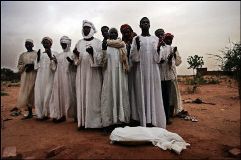Worst still to come in Darfur-U.S. aid official
By Richard Waddington
GENEVA, Oct 4 (Reuters) – The crisis in Sudan’s Darfur region, where more than a million people have fled their homes to escape violence, will worsen and the death toll could hit 300,000 this year, a senior U.S. official said on Monday.
 Although the U.N. and humanitarian agencies speak of 50,000 dead so far from fighting, hunger and disease, the coordinator of the U.S. Agency for International Development’s (USAID) humanitarian programme said the figure was guesswork.
Although the U.N. and humanitarian agencies speak of 50,000 dead so far from fighting, hunger and disease, the coordinator of the U.S. Agency for International Development’s (USAID) humanitarian programme said the figure was guesswork.
“The crisis has not yet peaked. We have not yet seen the worst in Darfur,” said William Garvelink.
The agency said in April that between 80,000 and 300,000 people could die, depending on how much access international aid workers had to those in need.
“We are coming to the high side of that range of numbers … I would say that we are probably in the 200,000-300,000 range by the end of the year,” he told a news conference.
The official, who recently visited the area with Ruud Lubbers, the U.N. High Commissioner for Refugees (UNHCR), said lack of food was a big problem as the harvest in the vast western region of Sudan had reached only 20 percent of normal.
People were already weak from struggling through the early part of the summer with little international help, and women and children would be particularly vulnerable to food shortages. “Woman and children will die at a much higher rate than they are now,” Garvelink said.
Violence intensified early last year when rebels took up arms, accusing Sudan’s government of discriminating against African tribes in the remote region and arming Arab militias to drive them off their land.
Fighting has continued despite a ceasefire agreed between the government and rebels in April. Some 1.3 million people have abandoned their homes and villages, mostly fleeing to camps within government-held areas of Darfur or neighbouring Chad.
Another 100,000 could soon cross into Chad, where 200,000 are being cared for by UNHCR, adding to growing tension with local people who feel they are being ignored by the international community, said U.S. Assistant Secretary of State Arthur Dewey.
Dewey, in Geneva to attend an UNHCR executive committee meeting, said Washington would provide $600,000 to finance a doubling to 16 in the number of human rights monitors deployed by the United Nations in Darfur.
But this would not restore the trust of those who had fled in the Khartoum government, which the U.N. says is not doing enough to halt a campaign of terror being waged by the Arab militias, known as Janjaweed.
“We have not seen sufficient response from the government … It is very frustrating,” Dewey told journalists.
